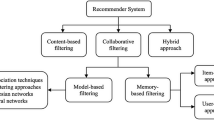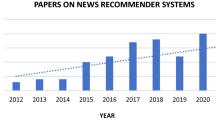Abstract
The development of social media provides convenience to people’s lives. People’s social relationship and influence on each other is an important factor in a variety of social activities. It is obviously important for the recommendation, while social relationship and user influence are rarely taken into account in traditional recommendation algorithms. In this paper, we propose a new approach to personalized recommendation on social media in order to make use of such a kind of information, and introduce and define a set of new measures to evaluate trust and influence based on users’ social relationship and rating information. We develop a social recommendation algorithm based on modeling of users’ social trust and influence combined with collaborative filtering. The optimal linear relation between them will be reached by the proposed method, because the importance of users’ social trust and influence varies with the data. Our experimental results show that the proposed algorithm outperforms traditional recommendation in terms of recommendation accuracy and stability.









Similar content being viewed by others
References
Anand SS, Griffiths N (2011) A market-based approach to address the new item problem. In: Proceedings of the 5th ACM conference on recommender systems. New York, NY, USA, p 205–212
Bonhard P, Sasse MA (2006) “Knowingme knowing you”—using profiles and social networking to improve recommender systems. BT Technol J 24:84–98
Cha M, Haddadi H, Benevenuto F, Gummadi K (2010) Measuring user influence in twitter: the million follower fallacy. In: Proceedings of international AAAI conference on weblogs and social media (ICWSM), p 10–17
FabPazzani M, Billsus D (1997) Learning and revising user profiles: the identification of interesting web sites. Mach Learn 27:313–331
Gayo-Avello D, Brenes DJ (2010) Overcoming spammers in twitter-a tale of five algorithms, Spanish conference on information retrieval (CERI)
Goldberg D, Nichols D, Oki BM, Terry D (1992) Using collaborative filtering to weave an information tapestry. Commun ACM 35(12):61–70
Granovetter MS (1973) The strength of weak ties. Am J Sociol 78(6):1360–1380
Guha R, Kumar R, Raghavan P et al (2004) Propagation of trust and distrust. In: Proceedings of the 13th international conference on world wide web, p 403–412
Guy I, Ronen I, Wilcox E (2009) Do you know?: recommending people to invite into your social network. In: Proceedings of the 14th international conference on intelligent user interfaces, p 77–86
He J, Chu WW (2010) A social network-based recommender system (SNRS). Springer, US
Huang Z, Chen H, Zeng D (2004) Applying associative retrieval techniques to alleviate the sparsity problem in collaborative filtering. ACM Trans Inf Syst 22(1):116–142
Huang J, Cheng X-Q, Shen H-W, Zhou T, Jin X (2012) Exploring social influence via posterior effect of word-of-mouth recommendations. In: Proceedings of the fifth ACM international conference on web search and data mining
Jamali M, Ester M (2009) Trustwalker: a random walk model for combining trustbased and item-based recommendation. In: Proceedings of the 15th ACM SIGKDD international conference on knowledge discovery and data mining, p 397–406
Jamali M, Ester M (2010) A matrix factorization technique with trust propagation for recommendation in social networks. In: Proceedings of the fourth ACM conference on recommender systems. ACM, p 135–142
Jebrin AS, Williams MA. Credibility-aware web-based social network recommender: follow the leader. In: Proceedings of the 2nd ACM RecSys’10 workshop on recommender system and the social web, Barcelona, p 1–8
Jøang A, Quattrochicchi W, Karabeg D (2011) Taste and trust. In: Trust management V, p 312–322
Kempe D, Kleinberg J, Tardos É (2003) Maximizing the spread of influence through a social network. In: Proceedings of the ninth ACM SIGKDD international conference on Knowledge discovery and data mining, p 137–146
Kim HN, Ji AT, Ha I, Jo GS (2010) Collaborative filtering based on collaborative tagging for enhancing the quality of recommendation. Electron Commer Res Appl 9(1):73–83
Kim HW, Xu Y, Gupta S (2012) Which is more important in internet shopping, perceived price or trust? Electron Commer Res Appl 11(3):241–252
Lathia N, Hailes S, Capra L (2008) Trust-based collaborative filtering. In: Karabulut Y, Mitchell J, Herrmann P, Jensen C (eds) Trust Management II. Springer, Boston, pp 119–134
Li F, Du TC (2011) Who is talking? An ontology-based opinion leader identification framework for word-of-mouth marketing in online social blogs. Decis Support Syst 51(1):190–197
Liu D-R, Lai C-H, Chiu H (2011) Sequence-based trust in collaborative filtering for document recommendation. Int J Hum–Comput Stud 69:587–601
Lü L, Medo M, Yeung CH et al (2012) Recommender systems. Phys Rep 519(1):1–49
Massa P, Avesani P (2007) Trust-aware recommender systems. In: Proceedings of the 2007 ACM conference on recommender systems, p 17–24
Milgram S (1967) The small world problem. Psychol Today 1:61–67
Netflix.URL[EB/OL] http://www.netflix.com
Nykl M, Ježek K, Fiala D, Dostal M (2014) PageRank variants in the evaluation of citation networks. J Informetrics 8(3):683–692
O’Donovan J, Smyth B (2005) Trust in recommender systems. In: Proceedings of the 10th international conference on intelligent user interfaces. ACM, San Diego, California, USA, p 167–174
Paterek A (2007) Improving regularized singular value decomposition for collaborative filtering. In: KDD-cup and workshop. ACM press
Pazzani M, Billsus D (2007) Content-based recommendation systems. In: Brusilovsky P, Kobsa A, Nejdl W (eds) The adaptive web. Springer, Berlin, pp 325–341
Sarwar B, Karypis G, Konstan J, Riedl J (2000) Application of dimensionality reduction in recommender system-a case study. Minnesota Univ Minneapolis Dept of Computer Science
Singla P, Richardson M (2008) Yes, there is a correlation: from social networks to personal behavior on the web. In: Proceedings of the 17th international conference on world wide web, p 655–664
Song X, Tseng BL, Lin C-Y, Sun M-T (2006) Personalized recommendation driven by information flow. In: SIGIR ’06: proceedings of the 29th annual international ACM SIGIR conference on research and development in information retrieval, p 509–516
Tang J, Chang Y, Liu H (2014) Mining social media with social theories: a survey. ACM SIGKDD Explor Newsl 15(2):20–29
Victor P, Cornelis C, De Cock M et al (2012) Trust- and distrust-based recommendations for controversial reviews. IEEE Intell Syst 26(1):48–55
Wall ME, Rechtsteiner A, Rocha LM (2003) Singular value decomposition and principal component analysis. In: Berrar DP, Dubitzky W, Granzow M (eds) A practical approach to microarray data analysis. Kluwer, Norwell, pp 91–109
Qiao XQ, Yang C, Li XF, Chen JL (2011) A trust calculating algorithm based on social networking service users’ context. Chin J Comput 34(12):2403–2413
Yang B, Zhao P, Ping S, Huang J (2012) Improving the recommendation of collaborative filtering by fusing trust network, computational intelligence and security (CIS), In: Proceedings of 2012 Eighth International Conference on. IEEE, p 195–199
Yu K, Schwaighofer A, Tresp V, Xiaowei X, Kriegel H-P (2004) Probabilistic memory-based collaborative filtering. IEEE Trans Knowl Data Eng 16(1):56–69
Yuan Q, Zhao S, Chen L, Liu Y, Ding S, Zhang X, Zheng W (2009) Augmenting collaborative recommender by fusing explicit social relationships. In: Proceedings of workshop on recommender systems and the social web, p 49–56
Ziegler C, Lausen G (2004) Analyzing correlation between trust and user similarity in online communities. In: Trust management, p 251–265
Acknowledgments
This work was partly supported by National Natural Science Foundation under Grant No. 61074315 and No. 71061005/G0112, and Natural Science Foundation of Ningxia under Grant No. NZ12212.
Author information
Authors and Affiliations
Corresponding author
Rights and permissions
About this article
Cite this article
Li, W., Ye, Z., Xin, M. et al. Social recommendation based on trust and influence in SNS environments. Multimed Tools Appl 76, 11585–11602 (2017). https://doi.org/10.1007/s11042-015-2732-0
Received:
Revised:
Accepted:
Published:
Issue Date:
DOI: https://doi.org/10.1007/s11042-015-2732-0




